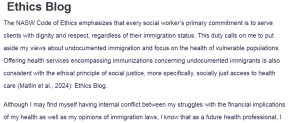Ethics Blog
The NASW Code of Ethics emphasizes that every social worker’s primary commitment is to serve clients with dignity and respect, regardless of their immigration status. This duty calls on me to put aside my views about undocumented immigration and focus on the health of vulnerable populations. Offering health services encompassing immunizations concerning undocumented immigrants is also consistent with the ethical principle of social justice, more specifically, socially just access to health care (Matlin et al., 2024): Ethics Blog.
Although I may find myself having internal conflict between my struggles with the financial implications of my health as well as my opinions of immigration laws, I know that as a future health professional, I am required to set my differences aside and provide them with the skill set to reduce their health disparities.
There are many impediments to becoming a United States citizen, and it can take years. Under existing rules, undocumented immigrants must first receive legal status, usually through a family member or employer sponsor, before they can begin on the path to citizenship. Because of backlogs and strict eligibility criteria, the process often takes many years, even decades.
Undocumented immigrants are largely prohibited from obtaining U.S. citizenship, leaving them vulnerable to systemic inequities (Dondero & Altman, 2024). As a professional, my job is to understand and acknowledge the structural barriers they face in accessing care, try my best to close that disparity, and not let my personal views stand in the way of my mandate.
In this situation, I would do everything I could to meet my ethical obligation of providing needed services. This aligns with the NASW values of service and competence in standing up for public health and the welfare of the community. Doing this work would require me to practice tolerance and empathy, listen to opposing views, and remain client-focused. While I might have opinions and beliefs regarding immigration reform, I am committed as a social worker to creating spaces for inclusion and accessibility to effective, caring healthcare for all who need it.
References
Dondero, M., & Altman, C. E. (2024). The Toll of Exclusion on Immigrants’ Health across the Life Course: Research Advances and Future Directions. International Migration Review. https://doi.org/10.1177/01979183241271638
Matlin, S. A., Hanefeld, J., Corte-Real, A., da Cunha, P. R., de Gruchy, T., Manji, K. N., Netto, G., Nunes, T., Şanlıer, İ., Takian, A., Zaman, M. H., & Saso, L. (2024). Digital solutions for migrant and refugee health: a framework for analysis and action. The Lancet Regional Health – Europe, 50, 101190. https://doi.org/10.1016/j.lanepe.2024.101190
ORDER A PLAGIARISM-FREE PAPER HERE
We’ll write everything from scratch
Question 
Imagine you are a social worker working for a rural public health care center. Although you are a professional, your salary is barely above the poverty guidelines. You have health insurance through the center, but the premiums and co-pays are very high. Recently you had to pay to have your three children immunized.
You have recently been assigned to coordinate a health van which will provide health care services including immunizations to undocumented immigrants in the area. You believe that undocumented immigrants should be expelled from the United States or gain citizenship to stay in the country.

Ethics Blog
- Discuss your feelings about providing services under the above circumstances. Tolerance in discussion is required to encourage the voicing of all opinions. You will have diverse opinions during the discussion and should take into consideration all opinions even if they are not well thought out.
- Research the guidelines for United States citizenship including the time frame for attainment. Share what you would do under these circumstances, returning to your country of origin is not an option.
- Please you can make use the NASW Code of Ethics.